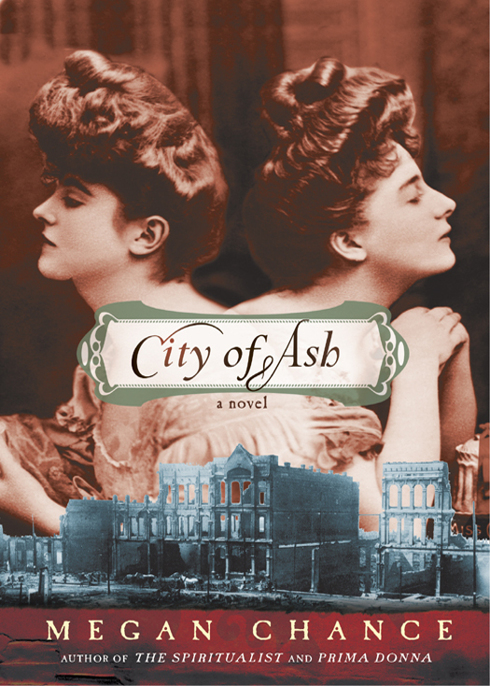
City of Ash
A Novel
کتاب های مرتبط
- اطلاعات
- نقد و بررسی
- دیدگاه کاربران
نقد و بررسی

Starred review from April 25, 2011
Leave it to Chance (Prima Donna) to pen a fine historical that's both a gripping novel and a study of the constraints placed on 19th-century women. When 23-year-old bohemian heiress Geneva "Ginny" Stratford oversteps the boundaries of propriety by posing nude for a painting exhibited at the Art Institute of Chicago in 1888, a humiliated Papa dispatches Ginny and her husband, Nathan Langley, to faraway Seattle, Washington Territory. Bad news outpaces the couple's transportation, and Seattle society snubs Ginny as she steps off the train. A virtual prisoner inside her own home, Ginny grabs at the opportunity when Nathan suggests she become a patron of playwright Sebastian DeWitt. DeWitt's new play, written for Beatrice Wilkes, a local actress who's become Nathan's mistress, inspires Ginny, who's blind to Nathan's ulterior motives. After Seattle burns to the ground, however, Ginny and Beatrice become unlikely allies. Stellar characterization, terrific dialogue, and a twisty plot make this story of old-time Seattle pop.

June 1, 2011
The fates of an ambitious young actress and an exiled society lady intertwine in 1889 Seattle when the Great Fire nearly burns the fledgling city to the ground.
Geneva Langley, daughter of a wealthy railroad tycoon, has it all, inviting the greatest artists of the day to her Chicago salons. All, that is, but a happy marriage. She poses nude for a sculptor, calculating that the ensuing scandal will force her husband Nathan to divorce her. Instead, she's sent to Seattle, where her husband smells political opportunity in the soon-to-be state. Seattle's cultural life pales beside Chicago's, but it does host theatres where Geneva, shunned by society, seeks solace and meets talented young playwright Sebastian DeWitt. Mrs. Langley, an art patron, is thrilled when her husband begins underwriting the production of a play DeWitt has written to showcase the acting of Beatrice Wilkes, whom he admires. Frustrated to have been thrown over for many a leading role and lacking qualms about using sex to gain advantage, Ms. Wilkes becomes Nathan Langley's mistress. The love triangle grows a fourth corner when lonely Mrs. Langley gravitates toward the playwright and her husband encourages their relationship, going so far as to suggest she take the stage, and in the very part meant for Ms. Wilkes, a complete reversal of mind given that he had previously forbidden such scandalous behavior since it caused their exile. Does Mr. Langley's interest in the theatre have more to it than lust for an actress resembling his wife? Mistress and wife ally against Nathan Langley's nefarious schemes, intricately developed against a scorched backdrop. Strangest of all, real life mimics DeWitt's play as they find themselves living parts to rival Hamlet's drama and deception.
With an Art-Nouveau-and-absinthe sensibility, tight plotting and stagecraft complete with traps and twists, Chance (Prima Donna, 2009, etc.) breathes a vitality into her frontier characters á la David Milch's Deadwood.
(COPYRIGHT (2011) KIRKUS REVIEWS/NIELSEN BUSINESS MEDIA, INC. ALL RIGHTS RESERVED.)

May 1, 2011
The latest Gilded Age epic from historical novelist Chance (Prima Donna) concerns Geneva Langley, a Chicago heiress trapped in an unhappy marriage. In an attempt to rekindle her distant husband's interest, Geneva feigns an affair with a sculptor. The only remedy for the ensuing scandal is exile to Seattle, still a backwater frontier town. Unfortunately for Geneva, Seattle society has already learned of her scandalous behavior, and the matrons she expects to befriend snub her. Mr. Langley, meanwhile, has taken up with Beatrice Wilkes, a Seattle actress seemingly destined for a lifetime of playing second fiddle to ingenues. Inspired by a fellow societal outcast and a charismatic but poor playwright, Geneva decides to try her hand at acting--and encounters her husband's mistress in the process. The story that ensues has as many twists and turns as a soap opera. VERDICT Chance's sharp writing, believable and detailed historical setting, and strong female characters keep her latest from descending into melodrama. Historical fiction fans are likely to be familiar with Chance, but the focus on women's relationships means crossover potential for women's fiction readers.--Nanette Wargo Donohue, Champaign P.L., IL
Copyright 2011 Library Journal, LLC Used with permission.

April 15, 2011
Chance sets her latest novel in early Seattle at the time of the Great Fire of June 6, 1889. She does a creditable job of describing the 32-block devastation, the disoriented survivors, and, of course, Seattles dreary weather. Alternately narrated by Geneva Langley, a scandalous society wife recently arrived in Seattle, and stock actress Beatrice Wilkes, frustrated in her career-furthering efforts, the novel illustrates the constraints on women in this era. The connection between Ginny and Bea is Nathan Langley, CEO of a Seattle mining company, an increasingly cruel man whose affair with Bea and power-mongering attitude ruin what was already a failing marriage. When the Great Fire creates many homeless and missing people, the two women scheme to eliminate their mutual enemy to gain independence, wealth, and fame. Evocative of Seattles rough history and early society, the story is as melodramatic and improbable as Beas theater roles but still as fun to read as Jane Adams Seattle Green (1987), which is set around the same time.(Reprinted with permission of Booklist, copyright 2011, American Library Association.)

























دیدگاه کاربران